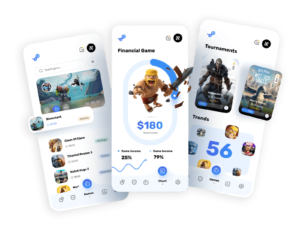Do you want to make your mobile game but need help finding where to start? Mobile Game Development is the answer. A specialized company created with gamers in mind, it offers experienced designers and developers who can help you build an interactive gaming experience for players of any device or platform.
Not only do they have the technical expertise to turn your ideas into reality, but their team also pays close attention to user-friendliness and ease of play, ensuring that whatever game you develop will be a hit among your users.
Read on as we dive deeper into what makes Mobile Game Development stand out.
Advantages And Disadvantages Of Developing Mobile Games
Mobile game development has become a popular trend for those looking to make a living in the global gaming market. It can be an exciting way to make money as long as you have technical skills, a creative mind, and plenty of determination.
There are also numerous advantages associated with mobile game development applications, such as increased accessibility and the reduced need for resources compared to traditional gaming platforms.
Of course, there are downsides, too – mobile game development requires staying ahead of the latest trends in mobile technology and ensuring the games meet performance requirements on multiple devices.
There’s also the challenge of monetizing assets correctly so that your game doesn’t suffer from an early death due to cold reception from players or inadequate returns on investments.
Creating a successful mobile game development can be incredibly satisfying despite these challenges. Many developers enjoy more flexibility while reaping greater rewards than they would in other, more established avenues of digital game design.
Advantages Of Developing Mobile Games.
1. Wide Audience Reach.
Mobile games have the potential to reach a large audience due to the widespread usage of smartphones and tablets. This means that developers have a large potential market to target with their games.
2. Low Development Costs.
Mobile game development can be relatively inexpensive compared to developing games for consoles or PCs. This is because mobile devices have lower hardware requirements, and many game engines and development tools are applicable for free or at a low cost.
3. High Engagement.
Mobile games are designed for short play sessions, making them ideal for on-the-go gaming. This means players are more likely to engage with mobile games frequently, leading to higher retention rates.
4. Easy To Publish.
Mobile game development is facilitated by the app store distribution model, which makes it easy to publish games and reach users quickly. This lets developers quickly iterate and update their matches based on user feedback.
Disadvantages Of Developing Mobile Games.
1. Limited Device Capabilities.
Mobile devices have limited processing power, memory, and graphics capabilities, which can limit the complexity and scope of mobile games.
Fragmented Platform Market.
The mobile market is fragmented, with many different operating systems and device types, making it difficult for developers to optimize their games for all devices.
2. Monetization Challenges.
While the mobile market is large, it can be difficult to monetize mobile games, as players are often hesitant to pay upfront for games. Mobile game development Developers must rely on in-app purchases or ads, which can lead to lower revenue per user.
3. Short Lifespan.
Mobile games have a relatively short lifespan, with many games losing popularity soon after release. This means developers must constantly release new content or games to maintain a consistent revenue stream.

Common Challenges With Developing Mobile Games
Mobile game development can be a complex process that involves several challenges. Here are some of the common challenges that developers may face.
Device Fragmentation
As mentioned earlier, the mobile market is fragmented, with many different devices running different versions of operating systems. This can create compatibility issues that can be difficult to address.
Optimizing for Performance.
Mobile devices have limited processing power, memory, and graphics capabilities, making it challenging to optimize games for performance while maintaining visual quality.
Monetization.
Monetizing mobile games can be difficult, as players often hesitate to pay upfront for games. Game development Developers must rely on in-app purchases or ads, which can lead to lower revenue per user.
User Retention.
Mobile games are designed for short play sessions, making it challenging to keep players engaged and coming back to the game. Developers must constantly release new content or updates to keep players interested.
Competition.
The mobile market is highly competitive, with many games vying for players’ attention. Developers must find ways to differentiate their games from the competition and offer a unique value proposition.
Quality Assurance.
Testing mobile games on a wide variety of devices and operating systems can be time-consuming and challenging. Bugs and performance issues can also arise due to the fragmentation of the mobile market, making it critical to test games before release thoroughly.
User Feedback.
Mobile game players are highly vocal and can provide valuable feedback to developers. However, sifting through user feedback and addressing issues can be time-consuming and challenging.
Securing A Gaming License: Understanding The Rules, Regulations, And Compliance Requirements
Securing a gaming license is critical for any company or individual looking to operate a gaming business. The process involves obtaining a permit from a regulatory body that oversees the gaming industry.
The first step in securing a gaming license is to research the rules and regulations of the regulatory body responsible for issuing the permit. This will involve understanding the legal framework for gaming in the relevant jurisdiction, including any restrictions on the types of games that can be offered and the age and location of players.
In addition, there may be requirements for background checks, financial disclosures, and rules governing the operation and maintenance of gaming equipment and software. Compliance requirements are an essential part of the licensing process. Gaming operators must comply with various regulations, including anti-money laundering laws, responsible gaming practices, and data protection laws.

In addition, gaming operators must maintain accurate and transparent records of their operations and finances and submit regular reports to the regulatory body overseeing their operations. Failure to conform to these rules and regs can result in significant fines or the revocation of the gaming license.
Overall, securing a gaming license requires a thorough understanding of the gaming industry’s rules and regulations, as well as a commitment to compliance and transparency. By following these requirements, gaming operators can ensure that their games are operated fairly and securely, protecting the interests of players and the wider public.
Mastering The Art Of Monetization: In-App Purchases, Advertising, And Other Strategies
The art of monetization is a complex and often essential skill for any app developer looking to generate a return on their investment. In-app purchases, advertising, and other strategies are critical to successful monetization.
In-app purchases allow users to purchase digital or physical products through the app itself. This can include virtual currency, new levels or features, and subscriptions. Developers can increase customer loyalty and streamline the purchasing process by offering products within the app itself rather than redirecting users to external sites.
Additionally, in-app purchases have been found to have higher conversion rates than other methods of monetization, such as pay-per-click ads or banner ads. Advertising also presents an opportunity for earning revenue from an app development project. Ads that appear within apps are often tailored to specific audiences based on demographics and interests to create more efficient targeting strategies.
Mobile game development Developers can choose from several different models, including cost per click (CPC), cost per impression (CPM), and cost per mille (CPM). Regardless of the model selected, advertisers are only charged when actual conversions take place, making it an effective strategy for those with tighter budgets.
Other strategies, such as affiliate marketing programs and sponsorships with other companies or platforms, can also boost revenue. Affiliate marketing allows developers to receive commissions when users purchase their apps. At the same time, sponsorships provide access to additional funds or special deals that come with partnering directly with certain companies or brands.
To achieve success, mastering the art of monetization requires creating a comprehensive approach that leverages multiple strategies, such as in-app purchases, advertising, affiliate marketing programs, and sponsorships. Through careful planning and execution, developers can craft an effective monetization strategy that generates significant returns on investment over time.
Overcoming Technical Challenges In Design, Audio & Video Resources
Success comes from having the right combination of professional knowledge and technical know-how when it comes to overcoming technical challenges in design, audio, and video resources.
A successful designer must understand the principles of design theory and have a firm grasp of the tools and software used for production. Audio engineers must understand acoustics, how sound travels through various mediums, and a comprehensive understanding of audio mixing software and hardware.

Video editors must understand how best to capture footage to be edited appropriately into a final product. Each discipline also requires a great deal of creativity and problem-solving skills. Designers must use their imagination to develop innovative solutions while working within established parameters. Audio engineers must be adept at troubleshooting when faced with unexpected problems or obstacles. Video editors must possess the necessary skills to creatively combine multiple components into a visually compelling and emotionally resonant cohesive whole.
Additionally, all three disciplines require understanding multimedia fundamentals such as color theory, file formats, compression techniques, and motion graphics. Knowing how these concepts apply will help designers master the technical aspects needed for assembling resources such as photos, videos, graphics, illustrations, animations, and sound elements into a unified audiovisual experience that meets the needs of viewers or customers.
Lastly, all three professions require an appreciation for aesthetic beauty; recognizing what looks good is essential when creating visual media like websites or films. Identifying trends in the audiovisual presentation can be invaluable in helping designers stay ahead of the curve when making crucial decisions about style or technology choices for their projects.
Connectivity & Cloud Computing: Optimizing Player Experience Across Platforms
Connectivity and Cloud Computing have become increasingly crucial for optimizing player experience across platforms. By bolstering the power of cloud computing and fast internet connectivity, game development developers can provide players with an immersive experience that can be enjoyed on multiple devices.
Cloud computing allows developers to store large amounts of data, allowing players to access their progress from any device they wish to play on. This eliminates the need for bulky hardware and long download times, as everything is stored online and instantly available. Connectivity also plays a crucial role in ensuring a smooth gaming experience, as it enables real-time data sharing between different platforms. This allows for seamless communication and collaboration between all players across various devices, enabling gamers to compete against each other regardless of platform or location.
Additionally, cloud-based gaming allows developers to provide regular updates without having each user manually update their software every time a new patch is released. This helps ensure everyone has access to the same content when playing together online, resulting in a more even playing field and improved user experience.
Leveraging Artificial Intelligence For Enhanced Gameplay & Level Design
The integration of artificial intelligence in gaming is revolutionizing the possibilities for game development design and level design. AI can be used to create more complex and challenging levels with a more excellent range of unique environments.
For example, using AI-generated terrain can create landscapes with unpredictable obstacles, making it more difficult for players to find the optimal path through a level. AI-driven characters can also act as intelligent adversaries, providing players with dynamic opponents who adapt their behavior based on player actions.

Utilizing AI algorithms, characters can react to changes in the environment and develop strategies to beat the player – further enhancing the challenge and replayability of games. Artificial neural networks (ANNs) can also generate content in real-time, allowing developers to create more intricate and realistic worlds with vibrant textures and changing weather patterns. With machine learning algorithms, game elements such as weapons, enemies, or even dialogue between characters can be generated in an automated way – reducing development times while still offering high-quality content.
Beyond these advances in game development design, artificial intelligence is also being used to develop new ways of interacting with games and creating new forms of storytelling within them. For instance, interactive narrative systems powered by natural language processing allow players to communicate directly with non-player characters (NPCs) using natural language and receive meaningful responses that move the story forward.
This gives gamers an immersive experience and a sense of agency within the gaming world. All these technological advancements have opened up exciting opportunities for creative game development designers to explore new possibilities in gaming – something that would not have been feasible before the advent of AI technology.








